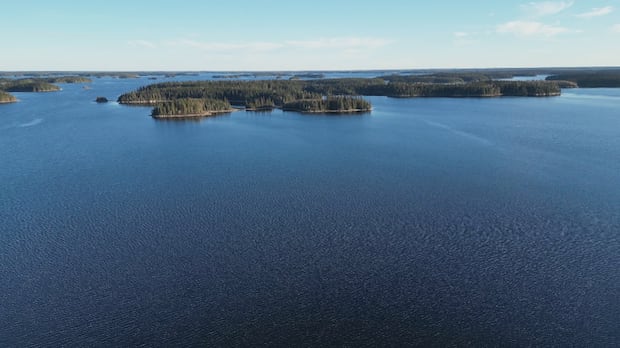ManitobaThe grand council representing First Nations in the Island Lake region of northern Manitoba says a state of emergency has been declared in one of its communities as it looks to contain an outbreak of hepatitis A.Grand chief says at least 1 person has died as province expands vaccine eligibilityArturo Chang · CBC News · Posted: Nov 14, 2025 5:30 PM EST | Last Updated: 2 hours agoListen to this articleEstimated 4 minutesThe audio version of this article is generated by text-to-speech, a technology based on artificial intelligence.Anisininew Okimawin — which represents the four Island Lake First Nations — says an outbreak of hepatitis A is affecting all of its communities. (Tyson Koschik/CBC)The grand council representing First Nations in the Island Lake region of northern Manitoba says a state of emergency has been declared in one of its communities as it looks to contain an outbreak of hepatitis A.Anisininew Okimawin said in a social media post Thursday the four communities it represents — Garden Hill, St. Theresa Point, Wasagamack and Red Sucker Lake — have all been affected by the outbreak of the viral liver disease.Grand Chief Alex McDougall said Friday at least one person in the community has died with hepatitis A. He said about 30 cases have been confirmed in Garden Hill as of Monday, though numbers are expected to increase significantly as more data is gathered.”We are working diligently to try and put together our emergency response plan to the outbreak, putting together education and communication tools,” the grand chief said.”Our communities are preparing and planning for an immunization blitz … as soon as we can.”A state of emergency has been declared in Garden Hill, McDougall said.Hepatitis A can be spread through contaminated water or food, or close contact with infected persons and contaminated surfaces.Vaccine eligibility expanded; mass clinics comingA provincial spokesperson said Friday Manitoba Health is aware of the outbreak and has been working with Indigenous Services Canada and the affected communities.”The province is supplying vaccines and has expanded eligibility for area residents,” the spokesperson said. “All community members over six months of age are eligible for vaccination, as well as anyone travelling or working in these communities.”In Manitoba, people more than six months old are eligible to receive two doses of the vaccine as long as they have high-risk medical conditions such as chronic kidney or liver disease or if they have life-styles that put them at risk of infection, according to the province’s website.Anisininew Okimawin’s post called on residents to contact their nursing station to book a vaccination appointment.It urged people to wash their hands thoroughly, drink only treated, bottled or boiled water, use clean running water to wash produce, and cook food thoroughly. “The strength of our Anisininew nations depends on community action,” the post said. “By practicing strict hygiene, ensuring safe water access, getting vaccinated, and supporting one another, we will rapidly contain this outbreak and protect the health of our people.”A federal spokesperson said in an email Indigenous Services Canada is working with the Four Arrows Regional Health Authority to offer mass vaccination clinics.”We are also reinforcing safe water and sanitation measures, and sharing culturally relevant health information on prevention,” the spokesperson said.McDougall said an urban vaccine clinic for hepatitis, COVID-19 and flu shots will open as early as Monday.Outbreak preventable: Grand chiefMcDougall said the outbreak is largely due to the lack of critical infrastructure in the community. That includes lack of housing, which he said leads to chronic overcrowding and allows diseases to spread more easily.More than 1,500 people are on housing waiting lists across our four nations, the grand council said in a statement, calling the outbreak “the predictable result of decades of federal underfunding.””There’s a backlog in our homes. Most of our homes do not have potable or running pipe water and sewer,” McDougall said, adding that he was disappointed by the lack of supports and funding cuts for Indigenous communities in the latest federal budget. “It’s just constant, constant crisis mode for our communities.”Alex McDougall, grand chief of Anisininew Okimawin, in a file photo. McDougall says a lack of critical infrastructure is behind the outbreak. (Stefan Richard/CBC)Symptoms of hepatitis A include sudden onset of fever, loss of appetite, nausea, vomiting, abdominal discomfort as well as dark urine and jaundice. They typically show up between 14 to 28 days of being exposed and last less than two months, though they could continue for up to nine months in severe cases, according to Health Canada.The Island Lake region is more than 450 kilometres northeast of Winnipeg as the crow flies.ABOUT THE AUTHORArturo Chang is a reporter with CBC Manitoba. Before that, he worked for CBC P.E.I. and BNN Bloomberg. You can reach him at arturo.chang@cbc.ca.
Wednesday, 4 Mar 2026
Canada – The Illusion
Search
Have an existing account?
Sign In
© 2022 Foxiz News Network. Ruby Design Company. All Rights Reserved.
You May also Like
- More News:
- history
- Standing Bear Network
- John Gonzalez
- ᐊᔭᐦᑊ ayahp — It happened
- Creation
- Beneath the Water
- Olympic gold medal
- Jim Thorpe
- type O blood
- the bringer of life
- Raven
- Wás’agi
- NoiseCat
- 'Sugarcane'
- The rivers still sing
- ᑲᓂᐸᐏᐟ ᒪᐢᑿ
- ᐅᑳᐤ okâw — We remember
- ᐊᓂᓈᐯᐃᐧᐣ aninâpêwin — Truth
- This is what it means to be human.
- Nokoma









